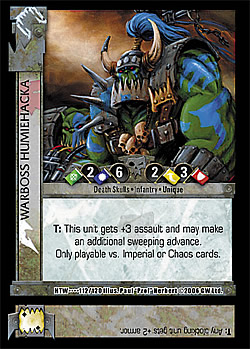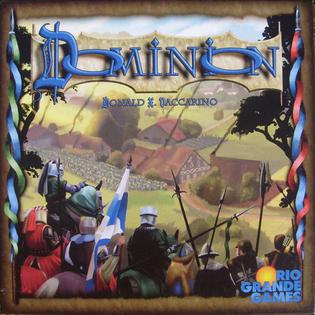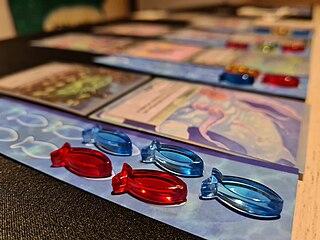
A Game of Thrones: The Card Game is an out-of-print collectible card game produced by Fantasy Flight Games. It is based on A Song of Ice and Fire, a series of novels written by George R. R. Martin. The first set was Westeros Edition and was released in August 2002. It has since won two Origins Awards. The game's primary designer is Eric Lang, the lead developer is Nate French, with Damon Stone serving as associate designer.

The Yu-Gi-Oh! Trading Card Game is a collectible card game developed and published by Konami. It is based on the fictional game of Duel Monsters created by manga artist Kazuki Takahashi, which appears in portions of the manga franchise Yu-Gi-Oh! and is the central plot device throughout its various anime adaptations and spinoff series.

Bohnanza is a German-style card game based on the game mechanics of trading and politics, designed by Uwe Rosenberg and released in 1997 by Amigo Spiele and by Rio Grande Games. It is played with a deck of cards with comical illustrations of eleven different types of beans of varying scarcity, which the players are trying to plant and sell in order to earn money. The principal restriction is that players may only farm two or three types of beans at once, but they obtain beans of all different types randomly from the deck and so must engage in trade with the other players to be successful.

Rummy is a group of games related by the feature of matching cards of the same rank or sequence and same suit. The basic goal in any form of rummy is to build melds which can be either sets or runs and either be first to go out or to amass more points than the opposition.

7th Sea is an out-of-print collectible card game (CCG) first designed by Dan Verssen and published by Alderac Entertainment Group (AEG) from 1999 to 2002.

Dark Millennium is an out-of-print collectible card game. It's the successor to the Horus Heresy and set in the fictional Warhammer 40,000 universe. The base card set was launched in October 2005 by Sabertooth Games.

Ultimate Combat! is an out-of-print collectible card game designed around the concept of Asian martial arts combat. The game was designed by judo sensei Dave Long and released in 1995 by Ultimate Games. It is very similar to Magic: The Gathering and roughly 75% of the rules are the same. It was endorsed by the United States Judo Association team, the USA Taekwondo team and the USA Wrestling team.
StarCraft: The Board Game, published by Fantasy Flight Games, is a game inspired by the 1998 computer game StarCraft. Players take control of the three distinctive races featured in the video games, the Terrans, the Protoss, or the Zerg, to engage in battle across multiple worlds in order to achieve victory. Each of the three races features a fairly different playing style. A prototype of the game was shown at BlizzCon 2007, with pre-release copies sold at Gen Con 2007 and Penny Arcade Expo 2007. It was publicly released in October 2007.

The Bleach Trading Card Game is an out-of-print collectible card game from Score Entertainment, and is based on the manga and anime series of the same name. The game received a nomination for Origin's "Game of the Year" and earned a semi-finalist position.

Battlestar Galactica Collectible Card Game is an out-of-print collectible card game based on the Battlestar Galactica science fiction media franchise. The game, published by WizKids, saw first release in May 2006 and was officially canceled in March 2007.
Civilization: The Card Game is a card game designed by Civilization IV lead designer Soren Johnson, based on Civilization IV. It was developed in 2006 by Firaxis Games, as a bonus in the Sid Meier's Civilization Chronicles boxed set, and is not available independently.

Ninety-nine is a simple card game based on addition and reportedly popular among the Romani people. It uses one or more standard decks of Anglo-American playing cards in which certain ranks have special properties, and can be played by any number of players. During the game, the value of each card played is added to a running total which is not allowed to exceed 99. A player who cannot play without causing this total to surpass 99 loses that hand and must forfeit one token.

Dominion is a card game created by Donald X. Vaccarino and published by Rio Grande Games. Originally published in 2008, it was the first deck-building game, and inspired a genre of games building on its central mechanic.
The rules of the collectible card role-playing game Magic: The Gathering were originally developed by the game's creator, Richard Garfield, and accompanied the first version of the game in 1993. The game's rules have frequently been changed by the manufacturer Wizards of the Coast, mostly in minor ways, but several major rule changes have also been implemented.

7 Wonders is a board game created by Antoine Bauza in 2010 and originally published by Repos Production. Three decks of cards featuring images of historical civilizations, armed conflicts, and commercial activity are used in the card drafting game 7 Wonders. The game received critical success upon its release, and won numerous awards, including the inaugural Kennerspiel des Jahres connoisseurs' award in 2011.

Freedom: The Underground Railroad is a 2013 co-operative board game designed by Brian Mayer and published by Academy Games, their first game in the Freedom Series. The game has drawn positive attention for its approach and handling of the topic.
Evolution: The Origin of Species is a card game created by Dmitriy Knorre and Sergey Machin in 2010. The game is inspired by evolutionary biology. It was published by SIA Rightgames RBG. English, French and German game editions were published in 2011. Two or more players create their own animals, make them evolve and hunt in order to survive.

The Genius: Rule Breaker is the second season of The Genius, which debuted on tvN on December 7, 2013.

Evolution is a 2014 board game where 2-6 players build a highly competitive ecosystem of omnivores, carnivores and scavengers. Players adapt their existing species and evolve new ones in response both to the abundance or scarcity of food, but also the behaviour of other species in the ecosystem. The scoring system rewards players whose species have high populations, consume the most food and are the most diverse. It was designed by Dominic Crapuchettes of North Star Games, working with Dmitry Knorre and Sergei Machin, who had previously released a similar game in Russia.

Oceans is a nature-themed strategy board game published in 2020 by North Star Games. It is a game in the Evolution series.















